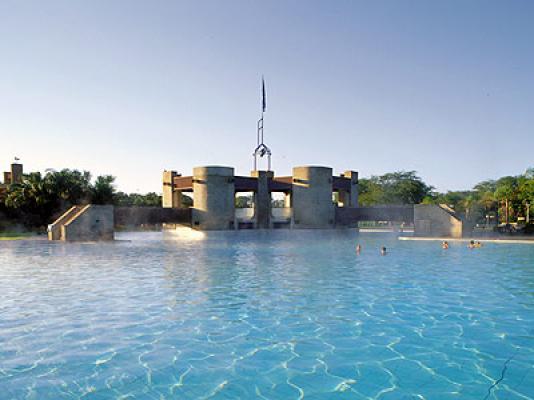Bela-Bela (which means the pot that boils), formerly known as "Warmbaths" or "Warmbad" in Afrikaans, owes its origins to the hot mineral springs that bubble out of the earth at about 22 000 liters of water per hour at a temperature of approximately 53C.
The water is rich in minerals such as sodium chloride, calcium carbonate and other salts, and is believed to have curative properties.
The pleasantly mild climate during the winter months and an average of 286 sunny days every year add to the popularity of the destination. The town is just over an hours drive from Gauteng and lies on the Springbok Flats on the highway to the north.
Bela-Bela is also a gateway to the southern Waterberg and Thabazimbi. Bela-Bela offers accommodationin a variety of types - from self catering chalets to lucury 5-star lodges.
Bela-Bela serves a thriving agricultural region and has some well-stocked game reserves in the area. Most of the resorts offer excellent conference, sport, accommodation, recreation and restaurant facilities.
Some of the reserves boast the Big Five and countless other savannah species against a backdrop of scenic Waterberg countryside.
The
hot springs at Bela Bela, were known to the local inhabitants for many
years. It yields over 20 000 litres of water per hour at a constant
temperature of 53C and flows into the enclosed spa complex, where pools
and spa treatment rooms are open to visitors.
The surrounding
grounds have been developed to provide a wide range of water sport
facilities, including super tubes; speed slides; a wave pool; river
ride; cable water ski-ing; tennis gokarts; paddle boats and horse
riding.
Accommodation is available at the hotel, at self
catering lodges along with a camping and caravan site. There is also a
modern conference facility.
Things todo at Bela-bela:
Safari Lodges
The R518 west from Bela Bela follows the mountain range to several private
game lodges. These include
Kwafubesi Tented Safari Camp and
Mabula game lodge
which offer numerous facilities. Game drives; bush walks and birding
excursions are part of the extensive programmes offered on these large
estates.
To the east is the well known Sondela Wildlife Centre
and reserve, equipped with rustic chalets and wonderful game walks and
self drive routes.
A unique 18 hole golf estate at
Zebula Lodges combines luxury privately owned accommodation, a clubhouse and game viewing drives on the estate.
Settlers Agricultural Museum
Settlers Agricultural Museum is a display of antique agricultural implements and tractors
Thaba Kwena Crocodile Farm
Within easy reach of the town you can visit the Thaba Kwena Crocodile farm, where over 10 000 crocodiles are reared;
Adventures with Elephants
It
is an educational elephant interaction facility located on a wildlife
reserve 35 km from Bela Bela off the R516 on the D1000 adjacent to the
Zebula Country Club.
Other
Other facilities around
Bela Bela include, a number of excellent spas; conference centres, some
offering additional attractions such as health spas and team building
programmes for the more energetic; clay target shooting; archery; golf,
horseback riding trails; watersports; angling, at any of the surrounding
dams and scenic drives into the mountains.
Attractions to visit
include the Anglo-Boer War blockhouse; the grave of Christina Pretorius,
the wife of Andries Pretorius; Buyskop, an Anglo-Boer War battle site
and also the quarry where the stone for the Union Building was quarried.
There
are restaurants to suit every taste within the town and particularly at
the Waterfront complex, where the Information Offices are located.
A visit to Bela-Bela provides a unique and invigorating family holiday in the heart of the Waterberg.
Contact
Bela-Bela Tourism
Tel:
(014) 736 3694Fax:
(014) 736 2890Shop No. 1 Warmbaths Waterfront, Marx Street, Bela-Bela
History of Bela Bela
The mineral springs that flows out of the Earth with a temperature
of 53C gave rise to the establishment of the town of Warmbaths - today
called Bela-Bela ("pot that boils" in Tswana).
The
water from these springs are rich in sodium chloride, calcium carbonate
and other salts that are highly beneficial to those suffering from
rheumatic ailments. From early days the
local Resorts was a popular destination.
Originally
the Voortrekker Carl Van Heerden established the first farm in this
area at the Mineral Springs and called it Het Bad. The area in and
around the mineral springs was a marshland where great numbers of wild
animals were trapped and died in the mud.
During 1873 the then
South African Republic (ZAR) realised the tourism and recreational
opportunities that Het Bad had to offer, purchased the farm and
established the town of Hartingsburg .
During the Anglo-Boer war
the British annexed the place and called it Warm Baths. The British
also erected a blockhouse to protect the railway line to Pietersburg
(Polokwane) and it still stands today.
A very few people actually
lived in Hartingsburg as the fresh water supply was poor and it was
visited by sick persons during only 5 months of the year. Although
Hartingsburg was the official name the place was commonly called
"Warmbaths". In 1903 the British government changed the name of the Post
Office to Warm Baths.
In 1920 Warm Baths was reproclaimed a
township and in 1932 Warmbaths achieved village town status and town
council status in 1960.
Since then the township has made rapid
strides. New residential areas sprang up, modern business concerns were
erected and magnificent schools and hotels made their appearance.
In the year 2002 Warmbaths was officially renamed Bela-Bela.



